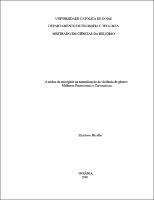| Compartilhamento |


|
Use este identificador para citar ou linkar para este item:
http://tede2.pucgoias.edu.br:8080/handle/tede/963Registro completo de metadados
| Campo DC | Valor | Idioma |
|---|---|---|
| dc.creator | Bicalho, Elizabete | - |
| dc.creator.Lattes | http://buscatextual.cnpq.br/buscatextual/visualizacv.do?id=K4700380H5 | por |
| dc.contributor.advisor1 | Lemos, Carolina Teles | - |
| dc.contributor.advisor1Lattes | http://lattes.cnpq.br/8034392675044483 | por |
| dc.contributor.referee1 | Ribeiro, Zilda Fernandes | - |
| dc.contributor.referee1Lattes | http://buscatextual.cnpq.br/buscatextual/visualizacv.do?id=K4766377A6 | por |
| dc.contributor.referee2 | Souza, Sandra Duarte de | - |
| dc.contributor.referee2Lattes | http://buscatextual.cnpq.br/buscatextual/visualizacv.do?id=K4700909H1 | por |
| dc.date.accessioned | 2016-07-27T13:49:19Z | - |
| dc.date.available | 2008-06-24 | - |
| dc.date.issued | 2001-06-18 | - |
| dc.identifier.citation | BICALHO, Elizabete. The stain of misogenous in the naturalization of gender s violence: pentecostal s and charismatc s women.. 2001. 176 f. Dissertação (Mestrado em Ciências Humanas) - Pontifícia Universidade Católica de Goiás, Goiânia, 2001. | por |
| dc.identifier.uri | http://localhost:8080/tede/handle/tede/963 | - |
| dc.description.resumo | Esta dissertação aborda a representação social da violência conjugal/doméstica, para mulheres que vivem este fenômeno e participam das expressões religiosas cristãs: pentecostais e carismática católica; movimentos religiosos contemporâneos, que reproduzem em seus discursos, a nódoa da misoginia, uma herança cultural, refletida na submissão feminina, onde se instala a culpa. A violência é entendida neste trabalho como resultado das relações de gênero, historicamente hierarquizadas e naturalizadas. As atoras desta investigação só saíram do silêncio submisso, quando se viram ameaçadas de perder, ou quando de fato perderam o marido agressor ou o patrimônio da família. Nestas situações, a sua fé religiosa se converte em rebeldia, levando-a à denúncia na Delegacia de Polícia após anos de reclusão familiar violenta. Como sujeito que se constitui pela heteronomia, a reação feminina se apresenta no momento em que ela não tem mais para quem dar seu amor incondicional e sua dedicação cotidiana. Na dor da perda, o amor se subverte e se revela em luta, enquanto vetor da subjetividade feminina para a vida social. Neste processo a mesma experiência religiosa, justificadora para a mulher de sua condição social desprivilegiada, representa para ela força e poder, no processo da denúncia da violência. | por |
| dc.description.abstract | This dissertation approaches the social representation of the violence in domestic realm and also between among some married people. Mainly for women that live this violence phenomenon and participate in the christian religious expressions: pentecostal and charismatic catholic; contemporary religious movements that reproduce in its speeches, the stain of misogenous, a cultural inheritance, contemplated in the feminine submission, where the blame is settled. The violence is understood in this work as a result of the gender relationships, historically hierarquical and naturalized. The actors (feminine gender) of this investigation had only left the submissive silence, when they saw threatened of losing or in fact they lost the aggressor husband or the family s patrimony in these situations. Their religious faith turns into rebelliousness, taking them to the police office after years of violence and family reclusion. As subject that is constitued by the heteronomy, the feminine reaction comes in the moment in that she doesn t have more for who give her incondicional love and her daily dedication. In the pain of the loss, love is subverted and it is revealed in fight while vector of the feminine subjectivity for the social life.In this process the same religious experience to justify for woman of their social non privileged condition represents for them force and power in the process of the accusation of the violence. | eng |
| dc.description.provenance | Made available in DSpace on 2016-07-27T13:49:19Z (GMT). No. of bitstreams: 1 Elizabete Bicalho.pdf: 857817 bytes, checksum: bfd444072cb2c9d53f0c21b24fd8c02a (MD5) Previous issue date: 2001-06-18 | eng |
| dc.format | application/pdf | por |
| dc.thumbnail.url | http://localhost:8080/tede/retrieve/3539/Elizabete%20Bicalho.pdf.jpg | * |
| dc.language | por | por |
| dc.publisher | Pontifícia Universidade Católica de Goiás | por |
| dc.publisher.department | Ciências Humanas | por |
| dc.publisher.country | BR | por |
| dc.publisher.initials | PUC Goiás | por |
| dc.publisher.program | Ciências da Religião | por |
| dc.rights | Acesso Aberto | por |
| dc.subject | Violência contra a mulher | por |
| dc.subject | violência doméstica | por |
| dc.subject | violência familiar | por |
| dc.subject | relação de gênero | por |
| dc.subject | religiosidade | por |
| dc.subject | mulher brasileira | por |
| dc.subject | renovação carismática católica | por |
| dc.subject | pentencostais | por |
| dc.subject | marianismo | por |
| dc.subject | sociologia da religião | por |
| dc.subject | representação social | por |
| dc.subject.cnpq | CNPQ::CIENCIAS HUMANAS::TEOLOGIA | por |
| dc.title | A nódoa da misoginia na naturalização da violência de gênero: Mulheres Pentecostais e Carismáticas. | por |
| dc.title.alternative | The stain of misogenous in the naturalization of gender s violence: pentecostal s and charismatc s women. | eng |
| dc.type | Dissertação | por |
| Aparece nas coleções: | Mestrado em Ciências da Religião | |
Arquivos associados a este item:
| Arquivo | Descrição | Tamanho | Formato | |
|---|---|---|---|---|
| Elizabete Bicalho.pdf | 837,71 kB | Adobe PDF |  Baixar/Abrir Pré-Visualizar |
Os itens no repositório estão protegidos por copyright, com todos os direitos reservados, salvo quando é indicado o contrário.




